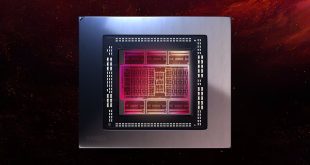AMD has introduced a new monitoring GPU metric with its latest preview graphics drivers. Named System Lag, this new metric measures the delay between the production of frames in a game and the subsequent rendering of the same frame by the graphics card.
CapFrameX noted the new metric is available in the 23.30.01.02 preview Adrenalin driver in games where Radeon Anti-Lag+ is supported. As such, you'll only be able to see these metrics on Radeon RX 7000 series GPUs and RDNA3 iGPUs.
New Adrenalin overlay metric: System Lag ?
The feature is available with 23.30.01.02 preview driver if Radeon Anti-Lag+ is supported. The numbers looking very similar to Nvidia's PC Latency, so there must be info from the game directly (render start) to be able to cover the… pic.twitter.com/odgJHJ7Afp
— CapFrameX (@CapFrameX) October 8, 2023
For those who don't know, AMD's Anti-Lag+ is an improved version of AMD's original Anti-Lag technology. In simple terms, Anti-Lag regulates the rate of CPU activity to ensure that it does not go too far ahead of the GPU, minimising the amount of CPU work queued up and improving frame synchronisation and latency. Anti-Lag+ does the same, but on a per-game profile basis, integrating frame alignment directly into the game code for a better result than standard Anti-Lag. It's worth noting that this functionality is limited to a few titles, including:
- Apex Legends
- Overwatch 2
- Dying Light 2
- Shadow of the Tomb Raider
- Rise of the Tomb Raider
- Resident Evil 4
- Ghostwire: Tokyo
- Fortnite
- Last of Us: Part 1
- Star Wars Jedi: Survivor
- Resident Evil 3
- Borderlands 3
While the introduction of the System Lag measure is an important step towards a better understanding of latency, it is critical to recognise that this metric does not capture all types of delay. Other technologies, such as Frame Generation (AMD Fluid Motion Frames), might add to the overall latency of the game experience.
The System Lag metric is enabled by default in the most recent preview drivers. It is accessible via the Performance tab in Metrics. Then look for System Lag in the Tracking options.
Discuss on our Facebook page, HERE.
KitGuru says: AMD System Lag isn't entirely new in the GPU landscape. Nvidia already had PC Latency which is pretty much the same. However, AMD lacked such a metric, so System Lag will definitely be a welcome addition to Radeon RX 7000 GPU users.
 KitGuru KitGuru.net – Tech News | Hardware News | Hardware Reviews | IOS | Mobile | Gaming | Graphics Cards
KitGuru KitGuru.net – Tech News | Hardware News | Hardware Reviews | IOS | Mobile | Gaming | Graphics Cards


